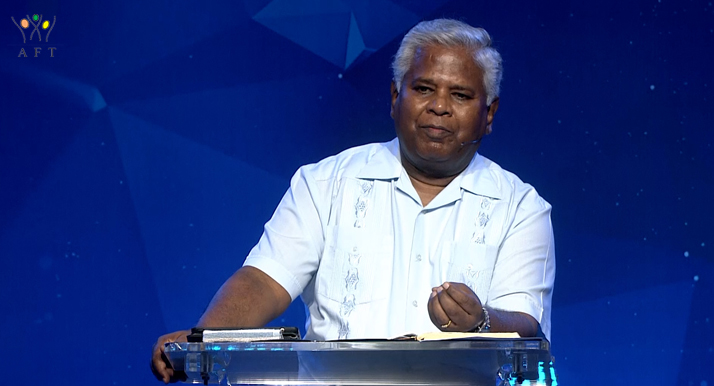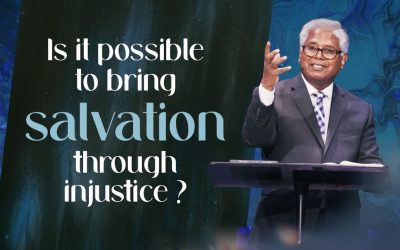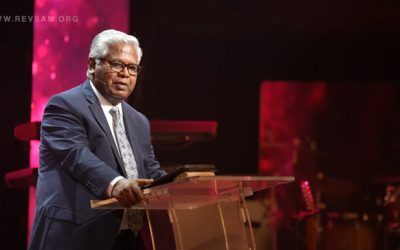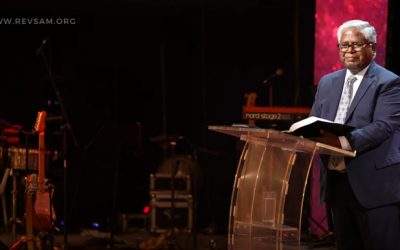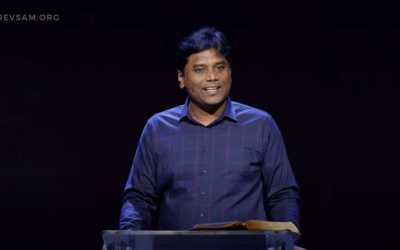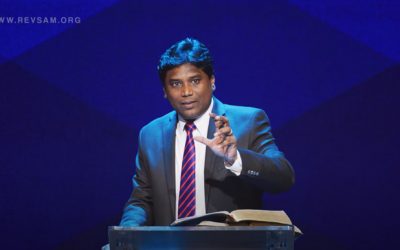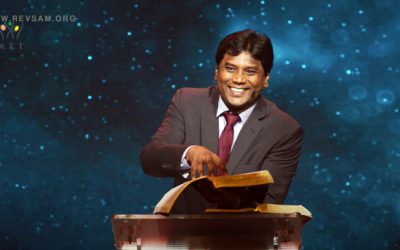
Abounding Grace (Vol. 41) – From Liberty to Slavery?
Sunday English Service – 17 OCT 21
Transcript
All right, let’s go to the Word of God. Please turn with me to Galatians, chapter 4. Galatians, chapter 4; let me read to you from verse 8 all the way to verse 11. Galatians chapter 4, verse 8-11. Formerly, when you did not know God, you were slaves to those who by nature are not gods. But now that you know God—or rather are known by God—how is it that you are turning back to those weak and miserable principles? Do you wish to be enslaved by them all over again? You are observing special days and months and seasons and years! I fear for you, that somehow, I have wasted my efforts on you.
Now, we’re teaching on grace and the book of Galatians brings a lot of clarity on the subject of grace and these days, we need it a lot. Now, ‘Galatians’ was written to churches that Paul established in the region called Galatia, which is the present time Turkey, which falls into the that area called Turkey. Remember, in the first missionary journey that Paul undertook, he went to the cities called Iconium, Lystra, and Derby and God did wonderful things there. And one of the remarkable things was that a lot of Gentiles came to Christ. And they come back happily reporting that God has opened the door of faith to Gentiles; they come back to report in the Antioch church. The Antioch church also is filled with a lot of Gentiles. So, they’re very happy. It’s like when you find Christ, when you come to know Christ, you want your people back home, wherever you came from, in your village, or in your town, your relatives and your people to know, Christ also. So, they’re happy to hear that a lot of Gentiles are now coming into Christ. And this is a new phenomenon in those days because the Christian church basically consisted of Jewish converts to Christianity but now a lot of Gentiles are coming. This is a remarkable thing that is happening there, and they were rejoicing over it. But in the midst of all that rejoicing, something went wrong.
As soon as Paul came to Antioch, after finishing his ministry in Galatia, some other people had gone there preaching another kind of gospel. They are Christians, they believed in Christ. They’re Jewish people who have believed in Christ. They go there and they preach another kind of gospel. Their gospel is, they say, “Well, you’ve received Jesus as Lord, that’s fine but that’s not enough. You need to be circumcised, you need to observe the special days and months and seasons and years, like we do in the Jewish calendar. And you have to observe all the things that we observe as Jewish people. You have to obey all the mosaic, ceremonial laws, you have to be circumcised, you have to observe all those special days, months and seasons, and so on”. Just imagine that these Greco-Roman people—those were the Gentile people—are now told to keep the Jewish Passover, for example, and the Feast of the First Fruits, the Ordinances of the Great Day of Atonement, the Feast of Tabernacles, and such things. These were part of the Jewish calendar; they kept it. They say you also need to observe it. In other words, they’re saying you first become a Jew, and then only you can become a Christian. This is the thing that they were preaching. Now, not only that, you know, they have to watch out what they eat and what they should not eat, all those Jewish restrictions on eating rules and so on, because certain foods were considered unclean by the Jews. And they were expecting these Gentile Christians also to follow that.
Now, this is such a terrible thing that brought such a controversy because this is burdening people with unwanted things. They’ve come to Christ, they’ve received baptism, they’ve joined the church, why do you want to convert them into a Jew? The Jewish people received all those ordinances, those festivals, those observances, all of those things, meant something for them. They were teaching them about Christ. Christ is the reality of which those things were foreshadowings, typologies. They were teaching about Christ. Now since Christ has come, that has become outdated now. After the ‘real’ has come, why do you want to go to the shadow? Christ is the real. So, those things now have no value because the ‘real’ has come? Why would anybody want to go to the shadows and hang onto the shadows? Not only are they hanging on to the shadows, but they’re also teaching Gentiles to come into that kind of an arrangement.
So, Paul is saying to these Gentile people, the Galatians, he says, “If you do that, if you do what these guys are saying, these Judaizers are saying, you will fall back under what he calls a ‘slavery of the non-gods’.” Now, listen to that term: the ‘slavery of the non-gods’; what is the meaning of this? What is the slavery of the non-gods? See, the Greco-Roman people, the Greeks and the Romans, the Gentiles, were into idol worship in those days. And the Jews were not. And if the Jews were insisting that these Gentiles follow their demands to follow their kind of laws and ceremonies, he says it’ll lead them, the Gentiles, into a slavery of the non-gods. Now, this is a very remarkable statement, because what God gave to the Jews is not something evil. God gave something good. It is all speaking about Christ, all the sacrifices, all the ceremonies, all the ceremonial laws, all the things about the clean and unclean and all of that. It’s all teaching about Christ, sin, and salvation and so on. So, they are not evil, they’re not bad, they’re good. But it’s just that now Christ has come, and the ‘real’ has come, and those things don’t make any sense.
Now, Paul is saying that if these Gentiles begin to follow those things, now, they will go back into slavery, like they were into when they were idol worshippers. That’s a very hard thing to say. In other words, he’s saying, “If you follow these Jewish laws and regulations, you will slip back into idol worship, like were into back when you did not know Christ”. Now, that’s too much to say. How can you call observance of Jewish things as falling into idol worship? What God taught the Jews to do was all signifying Christ. How can it become idol worship? It becomes idol worship because these things are placed in the place of the ‘real’. That’s what idol worship is all about, basically. That is why it becomes idol worship. And it’s a very, very strong statement, you know? Because the idol worshippers did all that they did in order to satisfy their God, in order to receive God’s favour and so on, as they believed it in those days.
Now, what the Jewish people are saying is that if you do this, only then God will favour you, God will bless you, God will save you and so on. So, it is a form of idol worship. There was a man named Harry Ironside; I don’t know if you’ve heard of him. He, back many years ago, I think about seventy-five years ago or so, he was preaching at the Moody Bible Church in Chicago, in America. The church was just started by D. L. Moody, the great evangelist. Then this man became the preacher after some years and was there for many years as a great Bible teacher. He says this – now, listen to this. He says, “I remember going through Max Miller’s set of translations of Oriental Sacred Literature, in 38 large volumes”. Just imagine 38 large volumes, he went through all of them. “I read them through, in in order to get an understanding of the different religious systems in the Oriental lands, and found that though they differed in 10,000 things, they all agreed on one thing”. He went through 38 volumes, read them, this preacher, in order to understand the Oriental religions. He’s a Westerner, who wanted to understand the Oriental religions. And as a result of reading them, he found that there are 10,000 differences between one religion and another. They are different in thousands of ways, they’re different but they are the same in one way. And what is that? He says, “They agreed on one thing and that is that salvation must be won by self-effort”. The only difference being as to what that effort was. “They all agreed on one thing”, he says, “that that salvation is by self-effort”. Everybody had their own definition of what that ‘self-effort’ meant but it was by self-effort. All thought, salvation by works and every religion except that which is revealed from Heaven, sets people doing something, or paying something in order to win divine favour. This appeals to the natural man. See, for an ordinary person, this is very appealing because he says he feels intuitively that God helps those who help themselves. And that’s a famous saying, isn’t it? God helps those that help themselves, and that if he needs or if he does his best, if a man does his best, surely then God will be interested enough to do something for him. “Now, this is a religious understanding of people everywhere”, he says.
But Harry Ironside says, “But our best amounts absolutely nothing”. Because Isaiah 64:6 says, “All our righteousness are as filthy rags”. Now, this is something that people of these various other religions are not able to understand. They say, “How can you say all our righteousness are as filthy rags? You mean to say that I do so many good things, and they amount to nothing before God? They’re like even filthy rags. Not only that, it amounts to nothing but you say it amounts to ‘filthy rags’. How can you say that? I do so much good. I do so much charity and you say it doesn’t count for anything before God? How come?” This because everything that man does is tainted by sin because man is a sinner. That is why in Christian teaching, when it teaches about sin, it teaches about a ‘pollution of sin’. Please understand this. Have you heard the doctrine of sin? When they teach the doctrine of sin in Christianity, they teach about ‘pollution of sin’. What is pollution? They say in Delhi, there is such pollution that people can’t even see what’s going on on the road, you know. If you’re driving, you can’t see what’s going on in front of you. Pollution covers the place like a dark cloud; heavy pollution. Everywhere, in all cities, I think we have pollution. Here in India and in many other parts of the world, pollution is in a very high level. Pollution is this, that there is something in the air that pollutes the whole atmosphere, that pollutes every person that comes under contact, so that you can keep your house locked and shut, every door, every window is shut, make sure that it’s all shut. Nothing’s coming in. And you go away on a vacation and come back home after one month and you touch your table, it’s full of dust. You don’t know where it came from; it will come for sure and settle in.
Just imagine how sin pollutes. Sin is a pollution like that. That means, a person may say, “I have never even thought anything evil; I’ve never even done anything evil. Therefore, I think I’m clean.” But the doctrine of sin in Christianity says, “That’s not right because even without you realizing, even without you knowing, sin is going inside of you. It is polluting you every place, your mind, your heart, your thoughts, your words, your whole being is polluted by sin”. That is how sin works; sin is such an evil. It comes in and pollutes you. And sometimes you don’t even know it. Now, when you’re going on the street, sometimes, the wind blows all kinds of garbage. It just blows on you, sometimes and you feel the dirt going in and you want to get down and wash your mouth and get cleaned up, you know because it’s pollution. But do you know when you don’t think that anything is coming in, so much is coming in? If you can only see how much has gone in by way of pollution, how much pollution has happened, how much you’ve been polluted by the dirt that is out there. You will be astonished and sin is like that. Sin pollutes and ruins everything, and completely defiles people.
Now, that is why our righteousness are of filthy rags because anything that we do is polluted by sin. It has got that taint of sin; it has got that coloration of sin. Nothing that comes out of us, no act that comes out of us can come without sin in it; it will have sin. That is why the Bible calls all our righteous acts as filthy rags. So, no matter how much we do; see, that is why we don’t believe in a religion of works. We believe in a religion of grace. Christianity is a ‘grace’ thing; it is not a ‘works’ thing. If we believe that no matter how hard we try, how much we work, how much good works we do, it amounts to nothing. It’s filthy rags, we believe. Because anything that we do, even the good things that we do, cannot come out without the dirt of sin in it, because sin pollutes everything. So, we do not believe in a religion of works; we believe in a religion of grace.
Now, Christianity and Judaism, this man is familiar, Ironside is familiar with Christianity and Judaism. What he means is, even Christianity and Judaism, see, the Christianity is from God. It is a thing that has come down from God, the way of salvation from God. That’s why it’s so different from others. All others agree that human effort must be there, that God will honour human efforts. Only Christianity does not agree. Because it is something that has come down from God, therefore it is different. No. And even in Christianity, sometimes, people get in there and make it into a man’s religion. They make it a ‘works’ religion. And that is what Paul is dealing with. Paul went and preached God’s way of salvation, which is by grace and through faith. But people are trying to go there and preach works religion, trying to bring in this works kind of religion, which is just like any other religion, and spread it among the Galatians. Paul is burdened with this thing. And he’s writing to the Galatians, warning them against this. And that is why I consider the book of Galatians so important because it deals with this issue. And this issue is very important for us today. Because today as a Christian, you can be following a grace way of salvation, and stand in grace and enjoy the liberty and the freedom that grace brings. Or you can be a Christian and be in bondage, literally because you’re following a works religion, a works kind of Christianity, work-oriented Christianity.
Look at chapter 5, verse 1, in Galatians, where Paul says, “Stand fast, therefore, in the liberty by which Christ has made his free and do not be entangled again, with the yoke of bondage”. What a tremendous statement. “Stand fast, therefore, in the liberty by which Christ has made you free”. What does he mean? He says, “Don’t, for any reason, give up the liberty—Christianity is about liberty. Liberty from what? Liberty from the bondage that works religion brings. Works religion puts you under bondage, under the bondage of guilt, under the bondage of you have to do this, you have to do that, in order to receive God’s favour. And no matter how much you do, God is never satisfied, you see. Do not give up your liberty, the joy, the peace, and do not enter into the bondage. That’s the message that Paul gives.
Now, we’re going to ask three questions and answer them, in order to understand what Paul is trying to say here in Galatians 4:8-11. What does he say in 8-11? He says, “Formerly, when you did not know God, you were slaves to those who by nature are not gods. But now that you know God—or rather are known by God—how is it that you are turning back to those weak and miserable principles?” Or ‘elements’, in some translations? “Do you wish to be enslaved by them all over again?” he’s asking them. “You are observing special days and months and seasons and years!”, he says. He looks at them and he says, “I fear for you, that somehow I have wasted my efforts on you”. You’re observing special days, months, and seasons and all of that. They’re backed into the Jewish religion, the works religion. And I’ve wasted, I think, my efforts on you. “I’m afraid that I may have wasted my efforts on you”, he says.
Three questions, if you ask, you’ll understand what he’s saying here, the warning that he issues here. One is, what are the ‘non-gods’? He calls them ‘non-gods’. He says, “Formerly, when you did not know God, you were slaves to those who by nature are not gods”. He is talking about them being idol worshippers. But look at the way he puts it: they are non-gods and you are slaves to those non-gods. What are those non-gods? We have to define it and understand it. Secondly, how does those non-gods enslave us? Because he says, “If you do these things, if you choose to go the Jewish way, you will be enslaved by it”. How do they enslave? Thirdly, how can we stand fast in the liberty wherewith Christ has set us free and do not get into the bondage? How can we keep our liberty and freedom?
Let’s start defining the non-gods; what are the non-gods? Now, we can simply say, well, they’re worshiping something that is not God, their idols, they were worshipping that. But the idol itself and idol worship and idolatry itself must be defined. The Bible teaches idolatry in a very broad way, not in a narrow way, such as just making an image and worshipping it. It mentions that; that is also idolatry. But if you look at the Bible teaching on idolatry, it is something very broad. It includes so many things, not just an idol sitting there in front of you, and you worshiping it. Let me show you how the Bible teaches it, but let me define it first, and then I’ll show you how the Bible teaches it. What is idolatry according to the Bible? An idol is anything in our lives, that occupies the place that should be occupied by God alone. Anything that occupies the place that must be occupied by God alone – you can define it like that. It can be anything, it can be an image, it can be something that you bring made of wood or stone or something and keep there and worship or it can be anything else that you have in your mind, that you have in your heart, that occupies the place that must be given only to God. That is what idol worship is.
Let me define it some other way, one more way. An idol is anything that is central to my life. Anything that seems to me as essential. What do you consider is central to your life? What do you consider is absolutely essential to your life? If you consider God, the living God, as central and essential to your life, then you’re right. But if you consider anything else as central and essential, then you’re an idol worshipper. You’re putting something in the place of God. Let me define it even more clearly. An idol is anything by which I live and on which I depend. If you say, “I depend on this; my life depends on this”. Is there anything that you depend on? And you say, “My life depends on this; my life and existence depend on this”. Anything other than God, then that means that’s your idol. Let me define it even more clearly. An idol is anything that moves and rouses and attracts and stimulates you – that’s an idol. Anything that moves, rouses, attracts, and stimulates you is an idol. See, that is why movie actors and actresses are called idols. People say, “That’s my idol? Why? They’re moved and roused and attracted by those persons. That is why they’re idols. Alright. One more. Idol is anything that I worship, anything to which I give my time, my energy and my money and it’s anything that holds and controls me. Anything that’s in a controlling position in my life, that’s an idol. What is it that I give my time to, most of my time to? What is it that I give my attention to, mostly? What do I spend most of my energy on? What do I spend most of my money on? What do I spend most of my everything on? What controls me? That’s my idol.
Now, this is a major theme in the Bible; this is how the Bible teaches, idol and idol worship. On the surface, it may look like it’s just talking about an object, an idol, and worshipping that but if you go into Bible teaching, it teaches you in this broad way. In the Old Testament, particularly, there’s a lot of references to idol worship, and it comes out very clearly. Consider the 10 Commandments, for example, the 10 Commandments. The 10 Commandments have a lot to say. If you ask God, how do I live successfully in this world? How do I live in a relationship with God, a relationship with people? And how do I live holy? God will put it in 10 Commandments, or 10 principles. I wish I could put it like that, the sermon will be over in 10 minutes. God can be so short, brief, and succinct. 10 Commandments, that’s it; everything is there. Everything that you need for holy living, for a life that you live in this world with others, how to live it peacefully with others, a holy life, and a relationship with God. All you need is given in the 10 Commandments or 10 principles. Now, if you look at the Bible teaching on the 10 Commandments, it’s like this: the very first commandment is that you shall have no other gods, right? The second commandment is about how you should not make any image and worship any image; that’s the second commandment. And all the rest comes after that.
Now, why did God put these two in the first place? Why is it put in this order? See, God didn’t take 10 Commandments and just shake them and put them you know, whichever came first. That’s not how He decided on the order. The order was decided by God’s infinite wisdom. God says this is first, this is second, this is third, this is fourth, this is fifth, and so on. That’s how the order came. And why God put those two things as first, that you shall have no other gods and you shall make no image and worship no image. These are the two things. Why did God put it first? He put it first —if you look at all the Bible teaching on this—it means that if you go wrong in these two matters, then you will go wrong in the rest of the eight. That’s the way it should be understood. If you miss it, in the first two, if you make something else your God, if you put something else in the place of God, and make that the God of your life, if you become an idol worshipper, if you bring something else, and say that this is the most important thing in my life, this is central and this is essential and this is the thing by which I live and this is what I depend on. Or this is the thing that arouses me, attracts me, moves me, and stimulates me. Or this is the thing that I give my attention to, my time and my energy and my money to and this is the thing that controls me. If you become an idol worshipper like that, you put anything else in the place of God in these ways, then, all those eight other things will not work out for you. These eight other things are about holy life, that you have to live before God and it’s about your life, that has to do with other people, your relationship and how you get along with other people, how you get along in this world. So, if you miss these first two, then you’re going to have a problem with the next eight, which is having to do with your life in this world with other people, and your relationship with God.
Now, you may say, “Is that how it teaches it?” Yeah! Even throughout the Old Testament, and in the New Testament, it comes out very clearly. In the Old Testament, there’s a lot of references to idol worship. In the New Testament, there’s scarcely any, very few references to the idol worship. But in the New Testament, its breath is clearly seen. How broad a teaching this is, is very clearly seen and it is seen in one particular verse. Please turn with me, this is very interesting. John’s epistle; the first epistle of John. There are five chapters in the first epistle of John, right. And go to the last verse, very last verse. Now, John is writing a letter. How do you write a letter? You start with a greeting and end with some nice words. But look at how John ends his letter. This is a letter he has written about three things in this letter. The three things are, how to live in the light. That means, how to live a holy life. Secondly, how to live in love – that is how to get along with others, how to love one another. Thirdly, how to live in God – how do you maintain your relationship and fellowship with God? How to live in holiness; how to live in light – that is, that is holiness; how to live in love – that is in relationship with others; how to live in God – that is your relationship with God.
After writing about this in five chapters. Now, the chapter divisions were made later on, but when he wrote it, he wrote it as a letter. After discussing these three things, living in light, living in love, and living in God, he ends his letter, like this. Amazing! Look at that line. Last verse, verse 21 of chapter 5: Little children, keep yourselves from idols. Amen. How do you like that? He never discussed idols anywhere else in the letter. He never spoke about idol worship. He spoke about living in light, living a life of holiness, living a life where you get along with others through love. And he spoke about your relationship with God and fellowship of God. And then he ends it by saying, “Little children, keep yourselves from idols. Amen”. Now, if you are writing a letter, is that how you’re going to write it?
Now, people that comment on it, they say, “There may be two reasons for this, the way he puts it”. One reason is that he doesn’t know how to write letters. The man doesn’t know anything, head, or tails, about writing letters. He writes a letter discussing three great matters of living in holiness, living in good relationship with people by loving them, and living in a fellowship with God. And then, brings in something that has nothing to do with what he has been saying all along, and ends it with that line saying, “Little children, keep yourselves from idols. Amen”. Unrelated stuff, totally unrelated. “He doesn’t know how to write a letter”, they say. But there is a second reason that some writers say. They say, “This line is the most important line in this whole letter”. Because he has taught about these three issues, living holy, living in good relationships with others, living in good fellowship with God. And now, he is expressing it all. The essence of all that he has said, is expressed in one line, and that is, “Little children, keep yourselves from idols”. And then he says, “Amen”. How can this be? They are sins. They say, “This is the essence because if you become an idol worshipper or in the sense that I taught about idol worship; I defined idol worship, biblically with the definitions that we gave. If you become an idol worshipper, or if you replace something else in the place of God, then you won’t be able to live a holy life, you won’t be able to live a life in good relationships with others, you won’t be able to live a life of good fellowship with God. These three things will become difficult if you if you become an idol worshipper. That’s why you keep your yourself from idols. After teaching about those three things, he says, “Keep yourself from idols. Amen”.
I remember when I first went to Bible college, we had to take a course on the Gospel of Mark. And I thought, this is going to be very easy. As I’ve read the Bible and Gospel of Mark, my goodness, this is easy. So, the guy first said, “Read it in four different translations”. I thought, why? I’ve never read any other translations other than KJV. I thought that’s the translation from Heaven, you know. Paul read it, Peter read it, everybody read it; why should I read any other translation? This guy says to read it in four different translations. Alright, we read it in four different translations. Then they come back, and he says, “Give me the essence of the whole Gospel in one line. One line; you write one line assignment. One line. And an assignment date was given, deadline. By that date, you bring this assignment, in one line state what this entire Gospel is all about. I thought, that’s nothing because I’m used to writing stories, you know. Because in history, and all, they told me, you write many pages. The more pages you write—this is the way we used to talk, in college, you know, here—the more pages you write, the better your grade will be. So, I made sure I wrote at least three pages. They told me write three pages, otherwise, you’re not going to get it. So, three pages of some rubbish, you know, whatever comes. And if you can write some English, you know, you’re lucky. You can just give it the best shot. That’s the way I studied. And I thought, no sweat. He wants only one line. I’m a person who writes so many pages, one line is so easy.
So, I went back and I wanted to write this one line. He said, “You must be correct, the essence of that book”. And to get the essence of the book, I had to read it another ten times, you know. I thought these fellows are torturing me. Why this torture? Why don’t you just tell me what that one line is, man? Just teach us; tell us what the one thing—the essence—is! And we’ll know it. Why do you want me to look up and come up with it? But that’s the thing, these guys are very clever, you know, in making you study properly. They know you will do all these tricks. They’re very economical in studies, you know. When it comes to studies, you do the bare minimum. So, how to make you do the maximum – they know every trick in the book. They will make you read it from the first page to the last page. That was the hardest assignment I had to do, believe me. To say it in one line, to say the whole Gospel in one line! I challenge you; if you do that, for every book, you will understand the whole Bible, by the time you do it. But it must not be more than one line. You have to give the essence of it in one line. And if you had to ever write an assignment where you had to write the essence of 1 John in one line, and that is this line: “Little children, keep yourselves from idols. Amen”. That’s it. That will do it. Because if you bring anything else, other than God, in the place of God, if you put anything else in the place of God, you will never be able to live holy, you’ll never be able to live in good relationship with others, never be able to live in fellowship others. All of the things will be a problem. All of the things will be a problem.
Now, how do all the other things become a problem? Just go back to the 10 Commandments again. If you fail in the two, then the eight becomes a problem. The eight has to do with the same thing: holiness, how to live with other people, how to live in fellowship with God. If you fail in the first two, all the other eight will become a problem. What’s the other eight? Shall not use the name of the Lord, your God, in vain; shall keep the Sabbath holy; shall honour your father and mother; and you shall not murder; you shall not steal; you shall not bear false witness; you shall not commit adultery; and then you shall not lust after what others have, right? 10 Commandments. If you look at them, all these eight has to do with a life of holiness, living a very clean, holy life, and living your life in a good relationship with others, including your father and mother and everybody, and living in a good fellowship with God. This is what the 10 Commandments are all about. And if you fail in the first two, you will fail in others. How? How do you fail in first two? You replace, in the place of God, you put something else. For example, suppose you put money in the place of God; suppose God becomes your money. Just how many murders are committed, think about it, for the sake of money in our country, or anywhere else in the world? For money, for the sake of money, the person committing the murder, he has decided that money is his god; that He will do anything to go after what belongs to him. If any man touches his god—the thing that he worships, the thing that he highly respects, the thing that he reveres—if anybody touches it, he’s going to murder, he’s going to do anything. He’s going to lie, he’s going to steal, he’s going to do anything to go after this thing that he considers the most important thing in his life. That’s the thing that thrills him, that’s the thing that attracts him, that’s the thing that motivates him, that’s the thing that he spends most of his time on his energy on and everything. And, when it comes to that, he’s ready to fight, he’s ready to hate, he’s ready to do any thing for that. That’s just one example. You’d make anything else God? Just imagine what kind of sins it produces, what kind of transgressions in produces of the Commandments. I can go on giving examples. I’ll give a little more examples but let’s go onto the second item.
So, 1 John 5:21 is a tremendous teaching on how the 10 Commandments are viewed by the Bible. Because “keep yourselves from idols” is a 10 Commandment thing. It’s about the first two Commandments. He puts it as the essence of his whole teaching about a life of holiness, a life of good relationship with others, and a life of a fellowship with God. He says, “That’s the essence”. If you become an idol worshipper, if you put anything else in the place of God, all these three things will go wrong. You will not be able to live a life of holiness, you will hate, you will feel jealous, you will feel bitterness, you will feel guilt, you will have all these difficulties, all these complications and problems, and it will result in all kinds of actions. “When you put anything else in the place of God, you’ve got all these problems”, he says.
Now, how does these non-gods…? We’re talking about non-gods, right? These things that are not gods but become gods to you. We defined them. But how do these non-gods enslave you? That’s the second question, we said. How do they enslave you? There’s another word in the Bible that often comes in the New Testament as well. But that requires a better translation. This other word is very often found in the New Testament, particularly. And that is the word that we translate in the New Testament as ‘lust’. Have you seen that word? There are many, many, many references to that word. But the problem is, when you say ‘lust’, you mind goes somewhere else. It’s about sexual sins and so on; it shifts to that area and that is not what lust is all about. It includes that but it’s not just all of that. It’s not only about that. It comes from a Greek word, ‘epithumia’; it sounds like a disease, doesn’t it? But really, it’s a spiritual disease. And it is translated as ‘lust’. So, people say, the translation of lust, always makes you think of sexual sins and therefore, it limits its scope, but this is about a much broader thing. Unfortunately, that is translated as lust. They say it must be translated as over-desire. Over-desire. Now, what is an over-desire? Over-desire is not desiring something too much, something that is wrong or something that is evil too much. If something is evil, you should not desire it at all, in the first place. Forget about over-desiring it. Right. You should not desire at all if it’s evil. So, over-desire is about desiring something good in a way that is not befitting. You’re designing something good; it is not evil. A husband is good, a wife is good, children are good, your job is good, your profession is good. All of these things are good, even money is good. All those things are good. But you take the good things and when you make them the idol, then the idol starts manipulating it, the idol starts making it such that it distorts the importance that must be given to that thing. And then, soon you begin to over-desire the thing that is good. You’ve got a desire it; you need to desire that good things happen to your children, they study well and they do well in their profession and so on. That’s a good desire. Right.
The Bible says, “God uses desires”. When you pray, you need to pray your desires. Whatever things you desire, when you pray, believe that you will receive them, and you shall have them, is what the Bible says. The Bible says, “Trust in the Lord, He’ll give you the desires of your heart”. Right. Desire is not bad; designing is a capacity that comes from God. Desiring, itself, is good. But this over-desire, a misplaced desire, that is what this idol does. When you make something an idol, then that distorts everything. It makes you think of things differently. It makes you desire something that is good with an over-desire. It distorts the value that is given to something. It takes normal desires and turns them into enslaving desires because it creates a faulty judgment. And when it creates a faulty judgment, you think about something in a way that you should not think about it, give it the importance that you should give it and put it in a place that you should not put it in. You’re giving it the place that belongs to God! You’re putting it as a primary thing or the premier thing in your life, the highest good. So, it takes normal desires and turns them into enslaving desires.
Now, if you see how this works out; let me give you an example of how this works out. Suppose you feel all bitter and angry, and you feel like slapping somebody, and killing somebody, because of what they have done. Say, for example, somebody has spoken about you, all kinds of things. Has anybody spoken about you, all kinds of stuff? Bad stuff. Oh, you guys look like nobody speaks about you, bad; only about me, they speak. Somebody speaks bad things about you. You feel such bitterness and hatred rise up within, and you make up your mind, next time when I see that guy, I’m going to slap him on his face, you know, punch him out. Sometimes, you feel like I want to kill that guy for what he has said. You know why you feel that way, why you feel like sinning, you know why that sin rises up, the sin of hatred the sin of despising someone, bitterness, and hatred? Why does it rise up, why you can’t keep your holiness, at the point, why the holiness flies away, and sin comes to rule and reign? Do you know why? Because you’ve put your reputation in a place that you should not have put it in. You’ve put your reputation as your God. That’s the most important thing in your life. That’s the thing that excites you, that’s the thing that you cherish most, that’s the thing that you think is the greatest thing of your life. Not God, your reputation, your good name, and you’re this thing, and you don’t want it to be ruined by any means. And that is why you feel like killing that person that said anything about you. That’s why you want to hate that person, that is why such bitterness rises up against you and that you don’t want to ever let loose of that. You want to deal with that person with that attitude forever. Because your reputation has been put in a place, you over-desire your reputation. It’s good to have a good reputation; it’s good to have a good name. It’s good to have a desire to have a good name and reputation. There’s nothing wrong with that. But if you make that your thing that you idolize, then when you’re in trouble. You end up sinning because of that; you end up doing things wrong. You begin to enter into bitterness and strife and anger and end up fighting, end up saying things and doing things that you ought not to be doing. All that comes from the fact that something that doesn’t deserve that place that you have put it in, you’ve put it in and made it your God, your primary thing, your ‘summum bonum’ or your highest good. So, you can’t stand somebody attacking that. See how it makes life difficult and how you’re not able to live with others in peace? A life of holiness is not possible, a life of love is not possible, and therefore, when you end up doing all these things and live in bitterness and strife and hatred, then your relationship and fellowship with God becomes difficult also. All of these things become difficult because you violated the first two Commandments. You put something in the place of God. This is how it enslaves. You know what non-gods are? Non-gods are all these other things that you put in the place of God, that’s how the Bible teaches it; that’s the 1 John 5:21 teaches it. It says, “Little children, keep yourselves from idols”. Suddenly, these people are not going to bring some little object and put it in and worship it there. He wants them to make sure that nothing else in their lives takes the place of God. If you look at the way Jesus interprets the 10 Commandments in the Sermon on the Mount, you’ll see that this is the way the Bible teaches idol worship. This is the way the Bible explains idol worship. Alright.
So, we looked at what are the non-gods. The gods are all these other things they bring in and make it God, you know. Many things, we can go one example after the other. A boy says to a girl, “I have no life without you”. A mark, that guy. He’s just talking movie dialogue. He’s not going to give you a good life. You need to marry a guy who says, “No matter who stands with me, no matter who is there, who’s not there, my God is there with me. I am happy in the Lord”. The fellow who’s happy in the Lord is the one that’s going to keep you happy. The fellow who says, “I have no life without you”, is going to make your life miserable. It’s going to be hell because he has no life without you. So, he wants to completely dominate you, completely do everything, you know, then it’s going to be a different story. But if a person is happy in the Lord, then he’s going to be happy with you. See, he’s got a wrong God; he’s got you in the place of God. You’re the thing that thrills him. And the thing is, the girl also likes it. She likes to be a god in his life and that’s what messes up the marriage completely, and the relationship completely. You can never achieve happiness, never achieve peace, never achieve a good relationship at all, because the whole thing is based on a wrong premise. If can go on giving examples but let’s go to the third thing and finish.
The third thing is, how do you keep your liberty? Now, Christ has set you free. From this mess, only God has set you free. Christian life is being set free from this mess. Why can you live successfully? How can you have peace? How can Christian life guarantee such peace that the world that cannot give? How can Christian life guarantee a good home, a good marriage, and all of these things? It’s because it frees you from these hang-ups, by coming and finding the true and living God, through Jesus Christ, and establishing a relationship with Him. You’ll dismiss all of these things that have been holding place as gods in your life. Those non-gods are gone now! That’s what Paul is saying. You used to worship those non-gods before, but now, you have left all those non-gods because you found the living God; you’re in a relationship with the living God. This is something real. You’re worshiping the true and living God, the one and only, true, living God. That’s the greatest thing that can happen to you. Because once you have that, once you dismiss all those non-gods and put them in their place, they may be good, but let them remain in their place. Put God in His place, and worship God and Him alone. Immediately, your life straightens out. There is peace, there is joy, there is happiness, there is every good thing. You’re able to live a life of holiness, you’re able to live life with others, happily, you’re able to have a life of fellowship with God, you’re able to have victory over sin. You’re not ruled by bitterness, strife, anger, frustration, hated; you’re feed from that.
How many of you say, “Christ has set us free”? That’s what Paul says in chapter 5, verse 1. He says, “Stand fast in that liberty.” Oh, that liberty is precious, what Christianity brings, what Christ brings is something amazing. He brings a freedom and liberty from all this mess that the world is going through. The world doesn’t even understand what mess they’re having, you know. The mess they’re having is because they’ve got all these non-gods ruling as gods. They’ve made themselves too many gods, that messes up their lives. And for the Christian who is worshipping the true and living God, the non-gods are dismissed, they’re put in their place. They’re no more gods; they’re there. You may desire, but not over-desire those things. Right. Stand fast in that liberty. Don’t give up your freedom and your liberty, my friend, not for anything. If somebody tries to come and put other things… See, the works, religion, puts those things as the things that will govern your life, your works. Do this, do that, then only God will bless you, then only God will favour you. You’re bringing something that’s going to make you very unhappy. God has already blessed you and God has already favoured you. So, how do you stand fast in the liberty that God has set you free? How do you not get back into that yoke of bondage again? How do you not get back into that mess, that life was before you came to Christ? How do you keep away from that messed up life, where you’ve got all those wrong priorities, where something else is always sitting in the place of God, and that’s what messed you up all this time? That’s what made life so difficult, and unhappy, and a failure. How do you keep away from that and how do you stand fast in the liberty and go forward successfully?
Look at what he says. Go back to Galatians 4 and look at verse 8 and 9 again. Formerly, when you did not know God, you were slaves to those who by nature are not gods. But now that you know God—or rather are known by God—how is it that you are turning back to those weak and miserable principles? Do you wish to be enslaved by them all over again? Now, look at the way he puts it. “Now that you know God and are known by God”. Two things: that you know God and you’re known by God. Why is he saying it like that? What is he putting is as more important in the two? Both are important but what is more important than the two? The way he puts it tells me that the fact that you are known by God is more important than the fact that you know God. Do you know that you knew God only recently but God has known you forever? Amen. And God has had you in His mind. God has chosen you; God has marked you; God has a purpose for you. Paul says, God has marked him for Apostleship. Even when he was in his mother’s womb, then only saved him. The Bible says, in Ephesians chapter 2 and verse 10, that God has determined the good works for which we must walk in, the good works which we must do and after deciding the good works that we must do, He saved us, so that we may do those good works. So, long before He saved me, He has listed the good works that I must do, all the things that I must accomplish. What makes you a Christian today, what makes you a believer today, what makes you a child of God today, is not that you know God. I’m glad you know God but that’s not what makes you a child of God. You knowing God doesn’t make you a child of God. God, knowing you has made you a child of God. Think about that; let that sink in. You’re a child of God because God has determined that you will be His child. God has decided that you will be His. That’s why He delivered you from sin and Satan and brought you to Himself. You’re known by God. How many of you are known by God? Think about that. You are known by God – that’s more important than you knowing God. Before you ever knew God, God knew you. You’re known by God. The fact that you are known by God is such a comfort. Oftentimes, I think about it. When there is a struggle, I think about it, that I’m known by God. Even from a mother’s womb, I’ve been known by God. God has marked me, chosen me, selected me, saved me, and has led me and guided me, so everything is going to be alright – that’s the way I think. I am known by God, is the greatest comfort that I received. Then only comes, the fact that I know God.
I’m glad I know God. At some point in my life, I came to know God. But God has known me, and that’s the thing that led me to come to know God. Now read 1 Corinthians, chapter 4; let me say this, and we’ll close. 1 Corinthians chapter 4, let me read to you from verse 2 onwards. Moreover, it is required in stewards that one be found faithful. He’s talking about his ministry and him as a minister and so on. He says, “Yeah, a minister, a preacher should be faithful, must be good, it’s required”. Then, he says in verse 3, “But with me it is a very small thing that I should be judged by you”. Yeah, it’s important for the preacher to be a good man, but I’m not expecting a certificate from you”, he says. It is not at all important for me, that you give me a certificate that I’m a good man. “It’s a very small thing”, he says, “that I should be judged by you”. And then, he says, “Or by a human court”. It’s a small thing for me for a human court to say that I’m good. After all, they’re human courts. In fact, I do not even judge myself. He’s saying three things. He says, “I don’t need a certificate from you that I’m good; that’s a very small thing for me. I don’t expect that. And it’s a very small thing for me to get a certificate from the human court. It doesn’t matter what they say about me, ultimately.” Because some human courts put him in jail for some time, punished him for some time. For what? What wrong did he do? So, he says, that human court and what it says about me is not a matter of concern for me; it’s a small thing for me.
Thirdly, very interestingly, he says, “Even my own judgment of myself is a very small thing. I may think I’m good, I may think I’m bad, I may feel good about me, I may feel so small about me. My judgement about myself is also a small thing”. What a confidence he has. I don’t need any certificate from you, I don’t need any certificate from any human court, I don’t need a certificate from myself even, that I’m good”. Then what, what is it that he’ll appreciate or what is it that he’ll respect? Next verse: For I know of nothing against myself, yet I am not justified by this. He says, “I don’t know of anything wrong, that is me, but I’m not righteous because of that, that I don’t know of anything wrong with me”. But He who judges me is the Lord. In other words, he says, “I don’t need a good certificate from you, I don’t need a good certificate from the court on this earth, I don’t need a good certificate even from myself. The Lord is my judge and as long as He thinks I’m good, as long as he thinks I’m righteous, I am fine”, he says. What a tremendous confidence. This is what I call liberty. This frees you from all guilt, this frees you from all inferiority, it frees you from all bitterness, anger, frustration, and all of these things of this person saying that thing, that person saying this thing, and worrying about what others have said about you, what others think about you. He says, “It’s a very small thing to me, because the only thing that matters to me is that God and what He says about me”. And the good news is, God says, “You’re righteous”. You’re not righteous because you think you’re righteous. He says, “I don’t find anything wrong with me but I’m not righteous because of that. God is my judge.”
What does God think about you? Do you know what God thinks about you? God thinks that you’re a blood-washed, child of God. You belong to Him; you’ve been marked by Him from your mother’s womb. You’re known by him. You may have known Him only recently; you are known by Him; you belong to Him. No matter what anybody says about you, no matter what a human court says about you, no matter what you even think about yourself. The fact is, you’re loved by God, you’re favoured, highly favoured by God, immensely blessed by God. That’s what God says about you. It’s just such a liberating thing. Look at that liberty. Just imagine living with this liberty every day, living in that in your mind, saying, “I don’t care what anybody thinks about me; I don’t care even what I think about myself, what anybody says about me”.
God loves me. God cares about me. God is my God. Therefore, I don’t care about what anybody thinks, what anybody says, Stand fast in that liberty, wherewith Christ has set you free. Let’s all stand together. Don’t ever get back into bondage. Bondage is the life that you used to live in. That bondage came because of the all the idols, non-gods that came in. The things that you made gods. Don’t get back into that, that’s not the Christian life. Christian life is a life of liberty. Somebody says, “Oh, they said all these things about you.” You say, “Praise the Lord; it’s a small thing for me. Because only what God says about me, matters to me. I only think of that as big.” Amen. It’s set you free; it’s liberty beyond measure.
Let’s life up our hands and give thanks to God.
How to live by faith during evil times? | Habakkuk 1:1-17 | Sam P. Chelladurai | 7-Jan-23
தீமைகள் நிறைந்த சூழ்நிலைகளில் விசுவாசத்தினால் வாழுவது எப்படி? | Sam P. Chelladurai | 7-Jan-24 | AFT
தீமைகள் நிறைந்த...
தேவன் பேசியிருக்கிறார்! நீங்கள் விசுவாசிக்கிறீர்களா?
தேவன் பேசியிருக்கிறார்!...
God has spoken! Do you believe it?
God has spoken! Do you...
ஆராதனையின் புதிய ஏற்பாட்டு அடிப்படைகள்
ஆராதனையின் புதிய ஏற்பாட்டு...
New Testament basics of Worship
New Testament basics of...
இயேசுவில் உள்ள தேவ மகிமையை ருசித்துப்பாருங்கள்! (பகுதி 2)
இயேசுவில் உள்ள தேவ மகிமையை...
Taste and see God’s glory in Jesus! (Part 2)
Taste and see God's glory in...
இயேசுவில் உள்ள தேவ மகிமையை ருசித்துப்பாருங்கள்!
இயேசுவில் உள்ள தேவ மகிமையை...
Taste and see God’s glory in Jesus!
Taste and see God's glory in...


